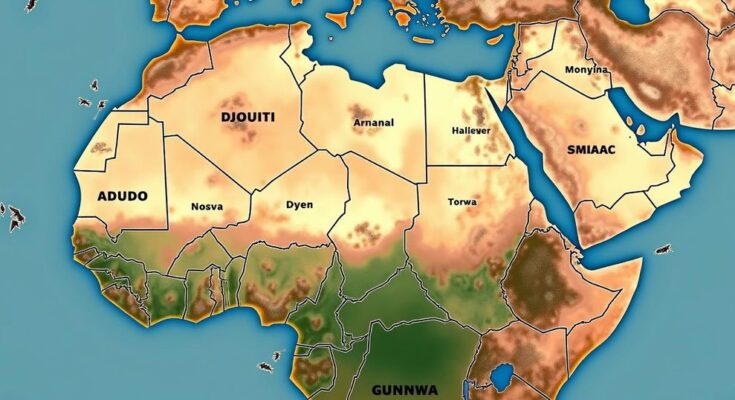The 2018 Review from Africanews examined major events across African countries, focusing on political developments, peace agreements, and social issues. Key highlights included Eritrea and Ethiopia’s peace, Abiy Ahmed’s reforms in Ethiopia, Kabila’s planned resignation in DRC, and the health issues of Gabon’s President Ali Bongo. The review provided a comprehensive look into the continent’s progress amidst ongoing challenges, offering an organized overview of significant news from Djibouti to Guinea-Bissau.
As the year 2018 concluded, Africanews retrospected the major developments across the African continent. The review is categorized into various sectors including news, sports, business, science and technology, and cultural events. Central themes analyzed over the year encapsulated women’s contributions, notable peace agreements, and Africa’s interactions with global entities, along with reviews of the presidential elections. Each country was assessed based on at least three significant news items, observing how they navigated domestic challenges, regional dynamics, and international relations. An overall overview of the year’s developments was archived in the special ‘2018 Review’ section available on the Africanews homepage, organized alphabetically from Djibouti to Guinea-Bissau. Djibouti’s Key Events: In 2018, Djibouti requested United Nations assistance to mediate its longstanding diplomatic conflict with Eritrea, focusing particularly on border issues and prisoners of war. Significantly, a $3.5 billion Free Trade Zone was inaugurated with the participation of African leaders and was funded by a Chinese company. Furthermore, Djibouti hosted the first overseas military base established by China, branded officially as a ‘logistics facility.’ Democratic Republic of the Congo (DRC): The DRC faced a tumultuous period politically with President Kabila announcing his intention to step down, paving the way for the long-awaited elections scheduled for December 23. During this time, Ebola outbreaks surfaced, prompting a swift response from the World Health Organization (WHO) and local authorities. Moreover, significant violence due to anti-government protests was reported, particularly against a backdrop of rising insecurity. Notably, Denis Mukwege, a prominent figure in human rights, was co-awarded the Nobel Peace Prize. Egypt’s Developments: President Abdul Fattah Al-Sisi secured re-election amid controversy, with opposition calls for voter boycotts influencing the electoral turnout. Furthermore, strained negotiations continued regarding Ethiopia’s Grand Ethiopian Renaissance Dam, with serious implications for Nile waters. Additionally, violent attacks against Copts persistently disrupted the nation’s peace efforts as Al-Sisi reinforced his commitments to safeguarding Egyptian citizens. Eritrea’s Progress: Eritrea marked a historic reconciliation with Ethiopia after decades of conflict, which facilitated the lifting of longstanding UN sanctions. These shifts allowed Eritrea to re-engage with various international partners, including major Gulf states and the United States. Eritrea’s election to the United Nations Human Rights Council reflected its commitment to improving domestic human rights conditions. Ethiopia’s Transformative Year: Under Prime Minister Abiy Ahmed, Ethiopia experienced substantial reforms aimed at stabilizing the nation and enhancing security while restoring improved relations with Eritrea. Abiy’s cabinet became emblematic of gender inclusivity with women holding significant positions, including the roles of president and chief justice. Abiy’s administration worked diligently with opposition figures to foster dialogue leading into the forthcoming elections. Equatorial Guinea: In Equatorial Guinea, the government confirmed details of a foiled coup attempt from the prior year, attributing the threat to foreign mercenaries. Notably, Vice President Teodorin Obiang Nguema’s detention in Brazil for financial irregularities drew international attention. A number of political detainees were released, indicating a potential shift in the government’s approach to opposition. Gabon: President Ali Bongo’s health issues commanded significant media attention during the year while the International Criminal Court concluded its investigations concerning post-election violence in 2016. Legislative elections took place, resulting in the ruling party maintaining control. Gambia: The Gambia continued its post-Jammeh recovery with initiatives, including a truth and reconciliation commission. The replacement of the vice president signified a step towards restructuring governance, although tensions concerning Jammeh’s possible return lingered. The nation’s reclamation of Commonwealth membership illustrated progress in its re-engagement with the international community. Ghana: The passing of former UN secretary-general Kofi Annan was a pivotal moment for Ghana, as the nation honored his legacy. In parallel, a corruption scandal involving the head of the football association prompted significant reforms in Ghana’s sports governance. A notable anti-government protest was also sparked by concerns regarding military cooperation with the United States. Guinea: Demonstrations demanding accountability highlighted widespread dissatisfaction with President Alpha Conde’s governance style, stemming from economic hardships and claims of corruption in government dealings with the French company Bollore. Guinea-Bissau: The ongoing political turmoil prompted the Economic Community of West African States (ECOWAS) to impose sanctions as elections continued to be postponed. The tragic outcome of a migrant boat accident underscored the human trafficking challenges facing the region. This review encapsulates the diverse spectrum of challenges and advancements observed across Africa in 2018, reflecting both the resilience and the complexities of the continent’s sociopolitical landscape.
The retrospective of 2018 covering top news from various African countries provides insight into the continent’s multifaceted challenges and achievements. By evaluating significant political events, economic developments, and social movements, this review serves as an important record of how African nations faced their unique issues within a global context.
The 2018 Review highlights critical political shifts, social dynamics, and advancements in governance across African nations. Key themes included the pursuit of peace, democratic governance, and economic development, underscoring the continent’s continuing evolution and the resilience of its people in the face of complex challenges.
Original Source: www.africanews.com




